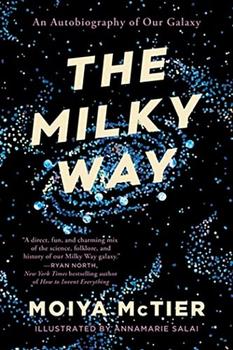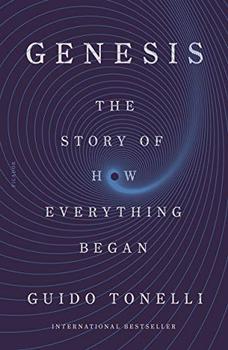Summary | Excerpt | Reviews | Beyond the book | Read-Alikes | Genres & Themes | Author Bio

Ten Keys to Reality
by Frank WilczekIs what you're reading right now real? Does the person that wrote it even exist? (I think I do, but that does not make it true!) Despite its understated title, these are the huge, epistemological questions Fundamentals helps the reader approach.
If anyone can manage to pull off explaining reality to a layperson in under 300 pages, Frank Wilczek seems a likely candidate. He is a renowned researcher who has worked on myriad advances in subatomic particles and physics over decades. Beyond his bona fide chops as a scientist, Wilczek writes with a clarity and sensitivity that has eluded many other authors of bestselling books in the layperson physics genre. Fundamentals is not so much an exposition by a bright scientist, but a scientist's summary of how we humans have answered existential questions and how we can continue pecking away at new ones in the future.
Perhaps the greatest compliment one can give a book covering the topics of astrophysics, biochemistry and quantum theory is that it reads almost effortlessly. The downside of many books in the "science of reality" genre is that even the best ones can be a slog to get through. Not knowing what the reader already knows, authors tend to spend an inordinate amount of time reviewing the core concepts underlying their new discoveries. These concepts — general relativity, quantum mechanics, the big bang, black holes — are not light or easy to skim over. Only after going through the "basics" can an author dive into their more nuanced insights — e.g., string theory, black holes, multiverses. Fundamentals avoids this trope, and its "10-step" approach to explanation is remarkably accessible.
Wilczek adroitly intersperses the technicalities of subatomic particles with slice-of-life vignettes from his own experiences and uses metaphors that are memorable and convincing. His narrative voice is neither too smart nor too cute. Fundamentals informs while never feeling condescending, and it goes into great detail without losing clarity.
The first five chapters cover the basics like all other books, but in a unique format. Instead of reciting the great discoveries and theories chronologically, Wilczek breaks down what is known into concise chapters with simple titles (i.e., "There's Plenty of Time," "There Are Very Few Ingredients," etc.). What differentiates Wilczek's approach from others is that he contextualizes each topic holistically. Whereas many similar books focus on the quantum (microscale) or the astronomical (macroscale) as two disparate entities that are somehow connected but not yet unified under a grand theory, Wilczek covers all such topics as a broad continuum. He notes without irony that though we look at the stars above us when we think about life, the universe, and everything, we may be better served to look inward. Each human body is arguably even more complex and mysterious, as it contains more atoms than there are stars in the universe.
The second half of the book is where Wilczek thrives. The final five topics are forward-looking, providing an outline of where scientific and critical thought can lead us in the future. A core goal of Fundamentals is to explore how the human race even got to the point where we are able to think about and answer both abstract and exacting questions about the larger universe.
Through what Wilczek calls "radical conservatism," science pushes our knowledge forward. Beyond just applying and sticking to the facts, he argues we learn more about our reality by attempting to apply what we know from one area into new contexts, even when we can't be sure that what we know actually works in a different time or place. When radical conservatism is effective, "you've discovered something useful," and when it's not, "you've learned something important." Science succeeds when we test our assumptions and disprove what we believe we already know.
Unlike any other book in this genre that I have read, Fundamentals does not conclude with a litany of questions to be answered before we know our place in reality. It doesn't end with a trite tale about future civilizations being built on our early work. Instead, it breaks the mold by offering a key and applicable takeaway.
In the spirit of "radical conservatism," Wilczek notes that there are myriad, context-based perspectives to all of reality, and no single perspective is ever true. This is a well-established fact but easy to forget. He recommends that by applying multi-perspective, open approaches to analyzing our everyday lives (i.e., our individual realities), we might become a more open-minded, empathetic, and capable problem-solving species. In essence, humility and awe about our place in reality — from the interstellar to the subatomic — will lead us to greater discoveries and a healthier existence during our relatively short period of consciousness in this universe.
In that sense, it may be the most hopeful, humanitarian book on physics you'll ever read.
![]() This review was originally published in The BookBrowse Review in January 2021, and has been updated for the
January 2022 edition.
Click here to go to this issue.
This review was originally published in The BookBrowse Review in January 2021, and has been updated for the
January 2022 edition.
Click here to go to this issue.

If you liked Fundamentals, try these:

by Moiya McTier
Published 2023
Astrophysicist and folklorist Dr. Moiya McTier channels the Milky Way in this approachable and utterly fascinating autobiography of the titular galaxy, detailing what humans have discovered about everything from its formation to its eventual death, and what more there is to learn about this galaxy we call home.

by Guido Tonelli
Published 2022
A breakout bestseller in Italy, now available for American readers for the first time, Genesis: The Story of How Everything Began is a short, humanistic tour of the origins of the universe, earth, and life - drawing on the latest discoveries in physics to explain the seven most significant moments in the creation of the cosmos.
I write to add to the beauty that now belongs to me
Click Here to find out who said this, as well as discovering other famous literary quotes!
Your guide toexceptional books
BookBrowse seeks out and recommends the best in contemporary fiction and nonfiction—books that not only engage and entertain but also deepen our understanding of ourselves and the world around us.